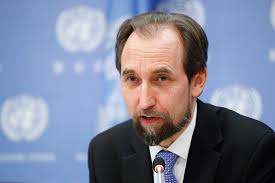UN Human Rights Chief, Zeid Al-Hussein, has stressed the urgent need for wealthier countries to open their borders to migrant workers rather than treat them as a burden or as criminals.
He said this on Monday in Geneva during the debate on refugee crises in regions including Europe, the Middle East and South-East Asia.
Al-Hussein said that as workers, consumers and taxpayers, they contributed in many ways to the economic growth of all societies, as many studies demonstrated.
“Few in this life can claim that they, or their ancestors, have not benefited from migration,” he added.
His comments came a day before EU interior ministers were to discuss a plan to distribute asylum seekers more evenly across the bloc.
So far, the main entry countries – Italy and Greece – have had to deal with a large share of the arrivals.
The controversial topic was also on the agenda of next migration summit of EU leaders.
Al-Hussein commended the EU’s new immigration plans, but insisted that that the bloc needed to take a far bolder step and welcome foreigners of all skill levels into their job markets.
He pointed at governments that have refused to let migrants and refugees land, including Indonesia, Malaysia and Australia.
Al-Hussein also warned against fanning xenophobia against immigrants.
“It can, and will if not treated properly, burst into firestorms of violence.
Laura Thompson, Deputy Chief of the International Organisation for Migration, stressed that governments should accept that people might flee both conflict and poverty, because very often the categories are not clearly distinguishable.
Carol Batchelor, Senior UN Refugee Agency Official disclosed that her organisation would issue annual statistics on Wednesday that would be “the worst in human history.”
Meanwhile, Amnesty International said the number of refugees worldwide had exceeded 50 million for the first time since the end of World War II.
It noted that the international response to this crisis has been “shameful, and called for an international summit focused on increasing international responsibility and burden sharing.
It noted that 86 per cent of the world’s refugees are hosted in developing countries, with a call on wealthier states to offer long-term settlement to 1 million refugees in immediate need.
It said that the largest nationalities among those making the risky crossing of the Mediterranean to Europe are Syrians, and over 4 million of them have fled their war-torn country.
“Although media reports have regularly characterized those making the journey from North Africa to Europe as migrants, many are in fact refugees.
The Amnesty criticised the international community for failing to respond to the crises in sub-Saharan Africa, where there are an estimated 3 million refugees, including hundreds of thousands who have fled conflicts in Nigeria, South Sudan, the Central African Republic and Burundi.
They all called for establishing a global refugee fund to pay for humanitarian aid and support countries hosting large numbers of refugees.
Copyright Ships & Ports Ltd. Permission to use quotations from this article is granted subject to appropriate credit given to www.shipsandports.com.ng as the source.

